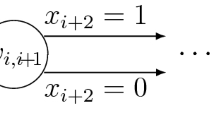Abstract
For multi-objective optimization problems, it is meaningful to compute a set of solutions covering all possible trade-offs between the different objectives. The multi-objective knapsack problem is a generalization of the classical knapsack problem in which each item has several profit values. For this problem, efficient algorithms for computing a provably good approximation to the set of all non-dominated feasible solutions, the Pareto frontier, are studied.
For the multi-objective 1-dimensional knapsack problem, a fast fully polynomial-time approximation scheme is derived. It is based on a new approach to the single-objective knapsack problem using a partition of the profit space into intervals of exponentially increasing length. For the multi-objective m-dimensional knapsack problem, the first known polynomial-time approximation scheme, based on linear programming, is presented.
Access this chapter
Tax calculation will be finalised at checkout
Purchases are for personal use only
Preview
Unable to display preview. Download preview PDF.
Similar content being viewed by others
References
M. Ehrgott, Multicriteria Optimization, Lecture Notes in Economics and Mathematical Systems 491, Springer, 2000.
A. Frieze and M. Clarke, “Approximation algorithms for the m-dimensional 0–1 knapsack problem: Worst-case and probabilistic analyses”, European Journal of Operational Research 15 (1984), 100–109.
B. Korte and R. Schrader, “On the Existence of Fast Approximation Schemes”, Nonlinear Programming 4 O.L. Mangasarian, R.R. Meyer, S.M. Robinson (ed.), Academic Press 1981, 415–437.
H. Kellerer and U. Pferschy, “A new fully polynomial time approximation scheme for the knapsack problem”, Journal of Combinatorial Optimization 3 (1999), 59–71.
H. Kellerer and U. Pferschy, “Improved dynamic programming in connection with an FPTAS for the knapsack problem”, Technical Report 05/1999, Faculty of Economics, University of Graz, 1999, submitted.
K. Klamroth and M.M. Wiecek, “Dynamic programming approaches to the multiple criteria knapsack problem”, Naval Research Logistics 47 (2000), 57–76.
M.J. Magazine and O. Oguz, “A fully polynomial approximation algorithm for the 0–1 knapsack problem”, European Journal of Operational Research 8 (1981), 270–273.
S. Martello and P. Toth, Knapsack Problems, J. Wiley & Sons, 1990.
C.H. Papadimitriou and M. Yannakakis, “On the approximability of trade-offs and optimal access of web sources”. In Proceedings of the 41st Annual Symposium on Foundations of Computer Science FOCS’00 (2000), 86–92.
U. Pferschy, “Dynamic programming revisited: Improving knapsack algorithms”, Computing 63 (1999), 419–430.
H.M. Safer and J.B. Orlin, “Fast approximation schemes for multi-criteria combinatorial optimization”, Working Paper 3756-95, MIT, January 1995.
H.M. Safer and J.B. Orlin, “Fast approximation schemes for multi-criteria flow, knapsack, and scheduling problems”, Working Paper 3757-95, MIT, January 1995.
E. Zitzler and L. Thiele, “Multiobjective Evolutionary Algorithms: A Comparative Case Study and the Strength Pareto Approach”, IEEE Transactions on Evolutionary Computation 3 (1999), 257–271.
Author information
Authors and Affiliations
Editor information
Editors and Affiliations
Rights and permissions
Copyright information
© 2001 Springer-Verlag Berlin Heidelberg
About this paper
Cite this paper
Erlebach, T., Kellerer, H., Pferschy, U. (2001). Approximating Multi-objective Knapsack Problems. In: Dehne, F., Sack, JR., Tamassia, R. (eds) Algorithms and Data Structures. WADS 2001. Lecture Notes in Computer Science, vol 2125. Springer, Berlin, Heidelberg. https://doi.org/10.1007/3-540-44634-6_20
Download citation
DOI: https://doi.org/10.1007/3-540-44634-6_20
Published:
Publisher Name: Springer, Berlin, Heidelberg
Print ISBN: 978-3-540-42423-9
Online ISBN: 978-3-540-44634-7
eBook Packages: Springer Book Archive




